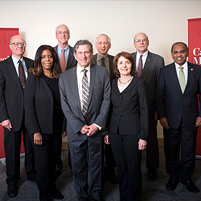'Heart of the Matter'

[l-r] John Lehoczky, Kiron Skinner, Hunter Rawlings, David Shumway, Baruch Fischhoff, Susan Polansky, Norman Augustine, Subra Suresh
At the request of Congress, the American Academy of Arts and Sciences commissioned the "Heart of the Matter," a comprehensive report on the current state of the humanities and social sciences that stresses their importance in creating a vibrant, competitive and secure nation.
Carnegie Mellon University — which has a long history of the humanities and social sciences collaborating with other fields to solve problems — and the American Academy held the first Pittsburgh-area discussion of the report and its implications for improving education and creating a sustainable global society.
"The humanities and social sciences are absolutely essential," said CMU President Subra Suresh in his opening remarks. He supported that statement by recalling that when he was director of the National Science Foundation millions of dollars were invested in systems to predict when tornadoes would strike. However, despite the investment 24 people died in Oklahoma last year as a result of tornadoes. "When I asked how this could happen, the answer was 'we predicted the tornadoes, but we could not predict how people would react.'"
Two members of the commission that produced the "Heart of the Matter," Norman Augustine, retired chairman and CEO of Lockheed Martin, and Hunter Rawlings III, president of the Association of American Universities (AAU), came to CMU to discuss the report and its implications. Rawlings is a member of the Global Learning Council, which is committed to the use of science and technology to enhance learning.
"It's more difficult, but no less important, to study the humanities and social sciences," Augustine said. "I do believe that while history doesn't repeat itself, it does tend to rhyme."
Rawlings called CMU a "remarkable institution that is different from the other research universities within the AAU because it is an incredibly interdisciplinary place with highly stimulated faculty that have their own approach to research and teaching."
Augustine and Rawlings joined four CMU faculty members — Baruch Fischhoff, Susan Polansky, David Shumway and Kiron Skinner — for a panel discussion moderated by John Lehoczky, dean of the Dietrich College of Humanities and Social Sciences.
"When I first read the 'Heart of the Matter,' I thought, 'that's what we try to do,'" said Fischhoff, the Howard Heinz University Professor of Social and Decision Sciences and Engineering and Public Policy.
Polansky, head of the Department of Modern Languages, shared the promising trend that Dietrich College students — as well as students from other schools and colleges — are taking more and more advanced language and culture courses, making them more attractive job candidates.
"It's a common concern that majoring in the humanities and social sciences does not directly link to a career path," she said. "But, more than 90 percent of employers agree that a candidate's demonstrated capacity to think clearly, communicate clearly and solve complex problems is more important than their undergraduate major."
Skinner, associate professor of social and decision sciences and director of CMU's Center for International Relations and Politics, highlighted the ways that the humanities and social sciences are poised to make war the option of last resort.
"History, culture, languages, decision sciences, psychology and anthropology are centrally important to blocking war," said Skinner, who organized the discussion. "Arguments win at the end of the day — bullies do not."
Shumway, professor of English and director of the Humanities Center, spoke about how the value of the humanities stems from how they deal with problems that cannot be solved or do not have a single solution.
"Humanities provide a framework to work with interpretation, analysis and judgment — all problems of intellectual value that students encounter in school but also in life," he said.
Carnegie Mellon's humanities and social sciences — which include the departments of English, History, Modern Languages, Philosophy, Psychology, Social and Decision Sciences and Statistics — are relatively young at CMU, compared to other institutions.
CMU humanists and social scientists use their research to solve problems and impact society. For example, philosophers are engaged in research related to medical ethics, computation and human rights; historians are developing policy recommendations for forensic DNA profiling and drug addiction; decision scientists analyze risk and behavior in problems ranging from obesity to climate change; statisticians work with experts in cybersecurity, brain science, data science, education and other fields to solve complex and challenging issues.
Following the panel discussion, 15 Dietrich College honors students showcased their research projects.
"Mapping the Future of the Humanities and Social Sciences" was part of "Crossing Boundaries, Transforming Lives," the yearlong celebration of the inauguration of Suresh as Carnegie Mellon's ninth president.
Related Links: View event photo album on Flickr | "Heart of the Matter," Report | American Academy of Arts and Sciences | "Crossing Boundaries, Transforming Lives" | The Simon Initiative | Dietrich College of Humanities and Social Sciences | Press Release
